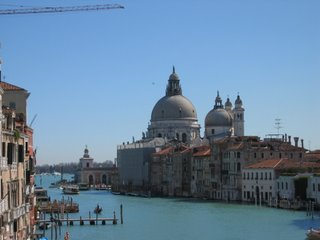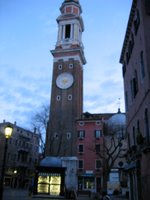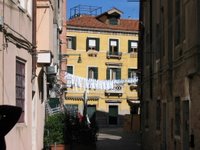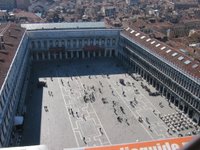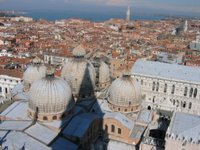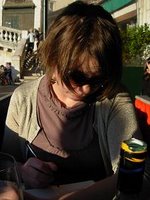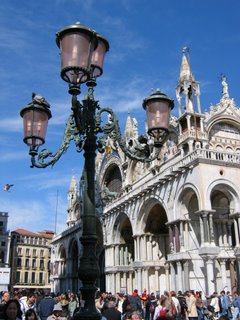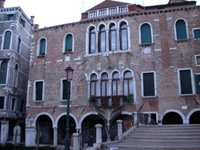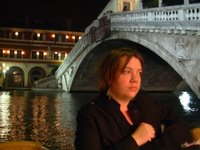Traditional Fields Family Easter Protocols (Circa 1985)
6:05 am: Upon exiting the bathroom, delight to find that the sun has started to rise, which means you can now go about waking people in earnest. Go first to your parents’ room and say “mom, mom, mom, mom, mom, mom, mom,” until she rolls over, groans and tells you to go back to sleep. Calmly inform her that this is not possible. Scoff and walk across the hall to wake your three-year-old sister. Tell her if she doesn’t get up the Easter Bunny take back all of her candy.
6:08 am: Return to parent’s bedroom with the enlisted support of your sister, her security blanket and your own stuffed raccoon (named Violet DuBois). Stand perfectly still with stare at your mother with the most puppy dog expression imaginable, trying to create the illusion that you are a sweet, frail child, instead of the Machiavellian tyrant you know yourself to be. Sniffle a bit. Let your sleepy eyed sister say something stupid like “Did the Easter Bunny bring something for Daddy?” that parents just eat up. Listen to mother groan. “All right. All right. Go put on your slippers and give me a few minutes.”
6:10 am: Sit crouched on upstairs with little sister, awaiting the green light to go downstairs, as Mom puts on bathrobe. Wonder at the amount of noise coming from Dad’s study. Secretly hope the Easter Bunny has brought you a Walkman.
6:12 am: Enter den, where two large, beribboned wicker baskets sit atop the gate-leg table in front of the picture window overlooking the lake. The sun has just cleared the tops of the mountains. Dash over the soon-to-be completely refinished floor to gape the mounds of chocolate rabbits, jelly beans, egg shaped petit-fors, sour candies, gummy bears, white chocolate lollipops, tiny pastel stuffed animals and one of those imitation Faberge eggs made of sugar with a tiny confectionary vignette inside. Wonder if it would be satisfying to eat. Trade sister a bag of gummy bears for her petit-fors. Thrill to discover, at the bottom of the basket, a cassette copy of Wham!’s “Make It Big,” but no Walkman. Your cousin once got a Walkman from the Easter Bunny, despite the fact that your cousin is kind of an asshole. You explain this to your mother on the way to the kitchen as you lick marzipan frosting off your fingers.
6:35 am: Coffee is made. You request a cup. It is served “Nana-style” with a lot of milk and at least three heaping teaspoons of sugar. Mom sticks a pan of hot cross buns in the oven and requests that you stop tormenting your sister. Which strikes you as typically harsh and unfair, as your sister has been trying to bite your arm for the last half hour. Your father emerges in a disreputable brown terry cloth robe and discussion begins about when or whether to go to church. This discussion will last for at least three more hours.
7:30 a.m.: You are nominated to call Nana. Nana tells you she loves you and wishes you a Happy Easter as you jerk the cord away from your sisters grasping fingers. Before handing the phone to your mother, you tacitly suggest that Nana is infinitely cooler, more loving and more generous than either one of your parents. Oh, and by the way, Nana would totally make the Easter Bunny bring you a Walkman.
8:00 a.m.: Dressing begins. For you, this involves dress (sometimes with pinafore), white tights, white leather (but never patent leather—white patent leather is tacky) Mary Janes and a large hair ribbon. Your sister’s dress is in a complementary color with a French lace collar and satin sash. Your mother takes you outside to pose you in front of the forsythia and pink dogwood so she can get a few snapshots before you get grass stain on your tights and chocolate all over your dainty white gloves. Your sister gets a speck of pollen on her dress and starts to cry. You take off running for the swingset deaf to your mother’s appeals, promptly fall and get grass stain all over your tights.
9:30 am: Your father has yet to shower, but your mother looks like she’s ready to go to a yacht party in Monte Carlo with Cary Grant. Her high heels precisely match the indigo of her low cut, full skirted linen dress. She wears a shiny gold choker and matching earrings, and you think she looks quite fabulous, despite the fact that you would have gone with something a little more Diana Ross (ruffles, feathers, sequins). She taps her heel against the floor of Dad’s study and suggests that he might hurry up if you’re going to make Sunday School. Dad sits in a leather chair of roughly the same color and condition as his bathrobe. He looks irritated at having been distracted from The New Yorker. You cross your fingers and hope your father ignores this request. “I, for one, don’t need to go to Sunday School,” you say, in your best approximation of a world-weary thirty-six year old. “I mean, don’t we all know the story?” Your mother warns you against blasphemy and shoots your father a look that says this is why we need to take them to Sunday school. Your sister asks for some orange juice. Your mother sighs. Your father tells you they’ve reprinted a story in the New Yorker by James Thurber.
9:55 am: You sit on the sofa in the den with your sister, disappointed that there are no cartoons, only church programming, which is boring and weird, though sometimes they wear interesting costumes. It is clear you will not be attending Sunday School, which is fine with you, because Sunday School is always boring. Last weekend you spent the night at Kristina’s house and went to her Sunday School class at the Lutheran Church where you learned two important things: 1) Martin Luther was not the biological father of Martin Luther King and 2) Palm Sunday did not mark the occasion in which Jesus and his disciples rented a condo at the beach. It’s hard to say which of these realizations was more disappointing to you. A month ago, your mother took you to Sunday School at her church for a few consecutive Sundays and you were instructed to memorize the titles of the books of the Old Testament with the promise of a prize. So you did, thinking that prize might include a Walkman, but actually it was just a coupon for free French Fries at McDonalds, which was kind of a bummer as you’re not a huge fan of either French Fries or McDonalds. You wrangle the remote from you sister and manage to catch the conclusion of “Splash” on HBO before moving on to MTV.
10:10 am: The airing of Madonna’s “Material Girl” video prompts a frantic dance party. Your three-year-old sister knows all the words. You indicate that you have a personal relationship with Madonna. Your sister appears to believe you.
10:35 am: The entire family loads into Dad’s sputtering Saab. Your bangs have already been parted unattractively by cowlick. Your mother tries to correct this as you fiddle with the rapidly expanding hole in your tights. The backseat is cramped, and feels more so because the red felt upholstery covering the ceiling sags like an old lady’s panty hose and threatens to engulf your Easter bonnet. Your mother reminds your father that there will be neither parking nor seating still available at the church. Your sister breathes. It irritates you. You ask her nicely to stop breathing and she takes the opportunity to smack her lips in your ears. By the time you get to the expressway, you’re hitting her and she’s biting you. Both of you insist that the other one started it. Your mother threatens punishment if the violence continues. Your sister keeps slurping. You raise a hand as a warning. Your sister screams that you hit her.
10:52 am: A parking space is discovered in the drive-thru lane of the Biltmore Village branch of Wachovia. You hustle over the green in front of the Church, where two ushers try and direct the bottleneck of tardy, well-heeled parishioners. Inside they’re already vamping on the pipe organ and you hope maybe this year you will get a seat with a decent view of the stage. But of course you don’t. You’re directed to the furthest back corner of the side arm of the cross-shaped sanctuary, which pretty much guarantees you will see nothing but the procession and recession. Once seated you crane your neck, see a few of your friends and try to get up and go see them, but are directed to sit down or else by your mother who looks like she needs a cigarette and a Bloody Mary.
11:00 am-12:00pm: Stand up. Sit down. Kneel. Stand up. Kneel. Sit down. Sit down. Stand Up. And also with you. Scoot the embroidered prayer bench back and forth using the heels of your shoes against the stone floor. Pick up the Book of Common Prayer. Put It Back. Pick It Up. Skim the Text. Add “in the bedroom” to the end of every sentence. Giggle. Ask your mother for a mint. Flip through the hymnal. Add “In the Bedroom” to the end of every title. Tilt your head back to look at the people in the stained glass. Try to figure out which one of them is supposed to be Jesus. Ask Jesus for a Walkman. Ask Jesus for a copy of “Like A Virgin.” Think about being a nun. Wish you were Catholic so you could be a nun. Figure you’d make it in a convent about a week. Hope that the person responsible for your inevitable excommunication would look a little like Andrew McCarthy. Twiddle your thumbs. Mess with the hole in your tights. Wish your guardian angel still brought your presents. Listen to your mother explain, again, that all the flowers in the front of the church came from the Biltmore Estate. Find the choir sort of boring. Sit down. Stand up. Ask if you take communion because you’d like a snack. Get denied. Go with your Dad while he takes communion and kneel beside him on the bench. Get blessed by the rector, whose fingers smell like Vicks. Go back to seat. Be bored. Try to make faces at friends across the church. Stand up. Ask if it’s almost over. Thrill at the recession. Watch an acolyte stumble while carrying a candle. Wonder if you’d survive if they had to evacuate the church in a hurry.
12:05 p.m.: Help yourself to iced butter cookies from central table in fellowship hall. Find friends. Ignore little sister. Tell your friends that the Easter Bunny brought you a Walkman. Pretend not to hear when little sister calls you a liar. Walk outside and try to enter as many closed doors as you can. Get shepherded back inside by your neighbor, who teaches your gifted class at elementary school. Ask her if it’s true that the Episcopal Church only exists because Henry VIII wanted a divorce. Glow with praise that you are precocious. Figure being called precocious at church means that God wants you to have a Walkman.
12:30 p.m.: Drive to Biltmore Estate, using Dad’s pass. Listen to mother ooh and ah over the spring greening of the grass. Wonder why there’s so much bamboo on the estate and no pandas. Ask to go to the house. Get told that you’re just going to the gardens to take pictures. Sulk because the gardens are boring. Walk through greenhouse. Get posed with your little sister. Ham it up for photographs. Try to appear as if you are a glamorous movie star. Get annoyed when your father does not take a picture of every single one of your practiced facial expressions—furious, distraught, sultry, tragic, Wonder Woman. Run out through the tulips, imagining that Heathcliff or Prince Charming or Han Solo or ideally David M. from your gifted class will pop out of the jonquils to receive your theatrical embrace. Imagine that you are a princess. Imagine that you live in the house and all the other people around you are peasants. Call someone a peasant under your breath. Feel bad. Know that as princess you would abdicate to lead the peasant revolt. Ask your dad for fifty cents to buy a Fresca from the vending machines. Wish you were in the throes of an epic romance. Make plans to call David later and ask him if he likes you and then hang up before he responds. Complain that your father is wasting all his film on your sister.
1:45 p.m.: Arrive at Country Club. Immediate take off for Ladies Lounge to lounge on the sofa for a little while, pretending that every woman that comes in is a guest at your Parisian salon. Make rounds through dining room, greeting all your friends. Brag about your haul from the Easter Bunny while finding some way to highlight the tragedy of not receiving a Walkman. I mean, I got a Wham tape, but what does the Easter Bunny expect me to play it on? The Fisher Prince tape player. God, I think not. Get told by at least six people that the Easter Bunny isn’t real. Explain that you know that, but that your three-year-old sister does not and so you have to go on pretending. This is absolutely true. Explain to no one that you are terrified of an evil, Easter Bunny doppelganger that haunts the pre-dawn hours of Easter morning. After all, that one might be real. You don’t really have any hard evidence one way or the other. So better safe than sorry. Incidentally, this more or less encapsulates your religious beliefs in a nutshell.
2:00 p.m.: Order a Shirley Temple and join the Easter buffet line for large helpings of some sort of casserole, chicken salad, overcooked scalloped potatoes and whatever seafood options are available. Avoid the beef for fear that it might be too chewy. Excuse yourself to return to the Ladies’ lounge at least three times during the meal. Practice an English accent. Practice an Irish accent. Practice a Russian accent. Think your French accent is pretty believable. Elect yourself chair of an imaginary committee. Try to replicate the opening dancing sequence from “West Side Story.” Perform a “Camelot” medley. Pretend to be imprisoned. Practice your swoon. Think you have tremendous natural talent as a tap-dancer. Flush a bar of soap down one of the toilets. Try to hide in the lobby. Run into Teresa in the hallway. Encourage her to play Cabaret Singer by Day/ Spy by Night in the bar. Discourage Teresa from inviting Erin, your nominal best friend to play along. Erin will want to add babies into the mix. Everyone knows that a glamorous spy would have nothing to do with a baby. War is hell. Tough women have to make sacrifices. Dodge the Gestapo all the way back to the dining room.
2:30 p.m.: Convene outside the Pro Shop for the Annual Easter Egg Hunt in and around the tennis courts and the eighteenth hole. Listen as some guy in a green golf shirt who looks like he’d rather be getting a root canal explain that there will be prizes for the most eggs collected. And one lucky person stumble upon the Magical Golden Egg that contains a magical prize for one very special little girl or boy. This last bit is delivered in a monotone. Look at Erin and roll your eyes. The countdown begins. Three. Two. Egg Hunt.
2:35 p.m.: You’ve been shoved, elbowed, trampled and roundly inconvenienced. You’ve crawled through pine mulch to retrieve two or three empty plastic eggs under a buggy rhododendron. You’re too short to reach the high places and too tall to crawl around like under the shrubbery. After all, you have some dignity, not to mention three new holes in your tights and a lot of pine needles stuck to your pinafore. Erin has managed all the same things without getting one single thing on her pink smocked dress. Which defies logic. Likewise the fact that what’shisface has found the Magical Golden Egg for the second year running. Amy tells you that what’shisface goes to Asheville Catholic and has a real Pac-Man machine in his house. Also he breakdances. You are so over breakdancers. You tell Amy he’s probably lying about the Pac-Man machine. And you should know. You’ve totally told that lie before.
2:38 p.m.: The magical golden egg is not magical at all. It’s a plastic pantyhose egg spray-painted gold. Contained inside, however, is a ten-dollar bill which pretty much the most magical thing you can take to the mall. What’shisface walks through the crowd cradling his prize with a smug grin and as much swagger as a four-foot tall third grader with a clip-on tie can muster. That guy is a dork, says Amy; because dork is about the worst thing you know to call someone. I don’t like him, you say. One of the boys flips him the bird and gets in trouble. You have no idea what flipping someone the bird means and are embarrassed of asking for fear of being mocked.
2:55 p.m.: Your mother takes a million years to finish talking and leave. You try to get Kristina to invite you back over for a sleepover at her house, despite the fact that you were there the weekend before. Kristina has a laundry chute large enough to crawl through, a Persian cat and a large, round sunken hot tub. Last weekend at Kristina’s you broke one of the jets of the hot tub, got caught going through her mother’s dresser drawer, kept Kristina up all night to her parent’s great consternation and taught Kristina and her seven year old brother the word “motherfucker,” which you’d recently learned from a Goldie Hawn movie. It does not cross your mind that you’ve done anything wrong. Even after you are never invited to Kristina’s house to spend the night ever again.
3:15-9:15p.m: Return home. Eat candy. Sit in the kitchen hallway eavesdropping on your mother’s telephone conversation while your sister falls asleep on the sofa to HBO. Later your dad will play a Miles Davis record and you will eat a grilled cheese. “The Sound of Music” will be broadcast tonight on one of the networks and you just can’t get enough of the nuns. You will be made to go to bed just after the wedding, but before the Von Trapps must run from the Nazis. You will be unable to fall asleep and sit up reading one of the four books you have squirreled away beneath your covers the light of the streetlamp. You will finish a chapter of “Watership Down” and dream about rabbits—good ones and evil ones. And Easter will be over until next year.
